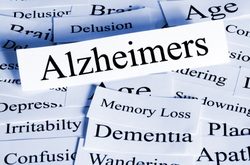|
10/23/2012 The Incredible Power of Love"If you would lift me up, you must be on higher ground."
~Ralph Waldo Emerson "Nothing we do, however virtuous, can be accomplished alone; therefore we are saved by love." ~Reinhold Niebuhr I was just reading in the Alzheimer's Reading Room of a study done jointly by Johns Hopkins and the Utah State University on the topic of whether a close caregiver relationship slows the progression of Alzheimer's Disease. From personal experience as a daughter and long term caregiver for my mother, my resounding answer is YES! Emphatically, absolutely, positively YES! The answer they arrived at in the study was also yes, but it wasn't quite as emphatic as mine. I guess when you are measuring with the heart and intuition, it may be clearer than with scientific instruments. Through my own direct observations and those of medical professionals and Alzheimer's support experts, it was often noted how unusually gradual my mother's decline was over a period of 17 years. She actually set a record for length of attendance at the day care facility, and was their "poster child" for optimal functioning with the disease. I am fully and gratefully aware that a large part of the credit for my mother's gentle, slow progression had to do with the excellence of the whole team participating in her care. However, I remain convinced that the life-long closeness (well, with the notable exception of the hormone hell of my teenage years, when one of us would have had to be approaching sainthood in order to have a peaceful, loving, untroubled relationship!) of our mother-daughter relationship and daily expressions of love and caring also dramatically helped. The study, conducted by Constantine Lyketsos, M.D., M.H.S., the Elizabeth Plank Althouse Professor in Alzheimer’s Disease Research and director of the Johns Hopkins Memory and Alzheimer’s Treatment Center and colleagues from Utah State, University of Washington, Duke University and Boston University examined 167 pairs of caregivers and Alzheimer’s patients. The pairs were recruited from the Cache County (Utah) Dementia Progression Study, which has tracked hundreds of people with Alzheimer’s and other types of dementia since 1994. The monitoring assessments were done using the Mini-Mental State Exam (MMSE) and Clinical Dementia Rating, with the tests given at six-month intervals, for a period of four years beginning in 2002. The caregivers were interviewed and questioned about their perception of the closeness of the relationship to the Alzheimer's patient -- not surprisingly, the caregivers who described a close relationship had partners with significantly slower measurable decline than those who did not have close relationships. Love energy is some of the most potent, powerful and postive energy in our human experience and volumes have been written to honor both the bond between mother and child and the love between husband and wife. I would also add the special, unconditional love of a pet to the equation (usually a dog, sometimes a cat) which adds tremendously to the quality of life and perhaps to a slowing of disease, including Alzheimer's. If you want to get metaphysical about it, love is a high frequency of vibrational energy, and can lift a person out of disease, which is a lower vibrational frequency. So, in my admittedly unscientific conclusion, I believe that love can lift us up to higher ground, working its miracles healing human hearts and minds through its magic. I have all the proof I need in my own life experience. Maybe one day, the science will catch up :) 10/3/2012 Memory Cafes & Overnight Respite Care I've just been reading about these two concepts for Alzheimer's care, which frankly could completely change the face of caregiving for families dealing with this difficult disease. Given that one of the biggest problems for family caregivers caring for their loved one at home is isolation/depression, the chance to be with a group of other caregivers (and care receivers) in an enjoyable social setting provided by the Memory Cafe is a perfect boost to mental and emotional health. Even respite care, though very necessary, doesn't provide the same kind of supportive, warm, interactive environment in which to simply exchange conversation, ideas and enjoy the company of others who completely understand the challenges of the Alzheimer's journey. It benefits both the caregiver and receiver to have this type of socially stimulating environment. It is not a "support group" for caregivers, since the aim is not to provide education, problem solving, or information, but rather just to have fun! The concept for Memory Cafes is really beginning to catch on in England, and is now being actively advocated here in the US as well. The focus is on positive reinforcement among peers, laughter, food and simple pleasure in the company of others who are going through the same journey -- without any stigma attached. After all, other caregivers will be much more understanding of behaviors that might cause embarassment in a public setting. According to John T. McFadden, in an article written for the Alzheimer's Reading Room: A Reminder: Why We Need Memory Cafes, "Memory Cafes are, first and foremost, a setting in which persons with memory loss can share fun and laughter with their care partners and friends in a setting free from awkwardness and stigma." Speaking as a former caregiver, I think this is a truly wonderful idea, one whose time has come! Mr. McFadden has written a newly released book to champion the cause, titled, Aging Together: Dementia, Friendship, and Flourishing Communities. He and his wife are planning to visit existing Memory Cafes in England in order to refine a model for use in America. This is a concept we should most definitely support. It just makes sense to tap this important resource we have in each other -- our sense of friendship and community, which can be an invaluable help to those on the front lines of Alzheimer's. The second concept, which is new to me, but has been practiced at the Hebrew Home at Riverdale in New York for the past 10 years, is overnight care for dementia patients to allow caregivers a good night's rest at home. This innovative concept makes 24-hour use of the nursing home facility, to provide day care from 8:30am to 4 pm and overnight care from 7 pm to 7 am. The program creates a sort of party atmosphere for the participants, with music, marimbas, and dancing as well as singalongs, crafts, and therapy sessions that last till dawn. There is also provision made for those whose Alzheimer's may be more advanced, which includes soothing sounds, aromatherapy, massage and touch therapy. If you would like to read more about this, here's a link to an Associated Press article appearing in the Wall Street Journal, updated October 1, 2012, titled: Overnight dementia 'camp' allows caregivers rest. Because so many Alzheimer's patients are very wakeful and sometimes agitated at night (called Sundowning), it creates major problems for families when their sleep is disrupted night after night by this behavior. Again, from a personal experience perspective, this was the single most insurmountable problem for my family -- sleep deprivation for months on end. It errodes a person's health, sanity, and makes the demands of caregiving impossible to continue. It is a major complaint of Alzheimer's caregivers and one of the main reasons for institutionalizing their loved one. It doesn't have to be if there are more programs for overnight respite care developed around the country. It really makes perfect sense to use facilities around the clock (with different shifts of staff, obviously), so that families can rest and resume their care duties after a good night's sleep. I would love to hear your feedback on these two concepts and any personal stories you'd like to share about how your family is affected by these challenges of caregiving. Feel free to comment below. |
About Karen
Karen is a compassionate, enthusiastic student of life, who cared for her mother for 17 years. She brings her insights, compassion, experience and desire to share knowledge and healing to this ongoing conversation with others on the caregiving path. If you are caring for a parent, spouse, friend or other loved one this site offers sanity-saving tips, open-hearted self-care ideas, and an open forum for discussion, connection and sharing resources for the journey. Archives
October 2021
CategoriesAll Acceptance Aging Together Alan Cohen Alive Inside Movie Alzheimer's Alzheimer's Prevention A Mind Of Your Own Anxiety Aromatherapy Audio Therapy For PTSD Austin Air Hepa Filter Autism Back Care Video Beginner's Mind Being Present Blessing For Caregivers Books Brain Insulin Butterfly Story Calm Calm.com App Care For Veterans Caregiver Advocate Caregiver Coalition Caregiver Comfort Kit Caregiver Guilt Caregiver Retreat Caregiver's Serenity Prayer Caregiver Stress Caregiver Support Care Giving Caregiving Vulnerability Care In Hospital Caterpillar Into Butterflies Chamomile Tea Cindy Laverty Comedian Computers & Exercise Crisis Dan Cohen Deepak Chopra Delirium Depression Diabetes Disaster Preparedness Distractions Dr. Dharma Singh Khalsa Dr. Oliver Sacks Eden Alternative Eldershire Elizabeth Dole Foundation Emergency Planning Emergency Preparation Emerson End Of Caregiving Enough Already Escapism Essential Oils Food Safety Forgiveness Funny Stories Gaiam.com Gail Sheehy Gift Of Alzheimer Gift Of Healing Presence GMO Food Green House Project Gregory Fricchione Md Grief Guilt Happy Light Healing Holding Hands Home As Sanctuary Hope Hospital Caregiving Hospital Stay Humor Inspirational Reading Ipods For Nursing Homes Isolation Jacksonville James E. Miller John Denver Johns Hopkins Study John T. McFadden Jon Kabat-Zinn Kelly Brogan Kirtan Kriya Meditation Lao Tzu Laugh Laughter Lavender Loneliness Loss Of Purpose Love Love In The Nursing Home Maya Angelou Mayo Clinic Mayo Clinic Alzheimer's Blog MD Meditation Meditation Garden Melatonin Memory Memory Cafe Military Caregiver Mindfulness Meditation Mr. Bean Music Music & Alzheimer Music And Memory Neurological Research Noise Pollution Operation Family Caregiver Opportunity Overnight Respite Care Pandemic Passages In Caregiving Patience Paul Coelho Peace Post-traumatic Stress Disorder Power Of Love Prayer PTSD Quality Of Sleep Radical Contentment Relaxation Releasing Problems Renewal Research Respite Rewind Rodney Yee Rosalynn Carter Rosalynn Carter Institute For Caregiving Rowan Atkinson Sanctuary Sanity Self Care Serenity Silence Sleep Slowing Time Solutions Soothing Music Stress Stress Relief Sun Sunshine Support For Caregivers Tai Chi Thanksgiving The Care Company The Kiss Time Traumatic Brain Injury Travel With Alzheimer's Person Treat VA Caregivers Valentine's Day Verilux Veteran Farms Veterans Veteran Suicide Vitamin D Wayne W. Dyer Wellness Wendell Berry White Noise William H. Thomas Worry Yoga Yoga Video |

